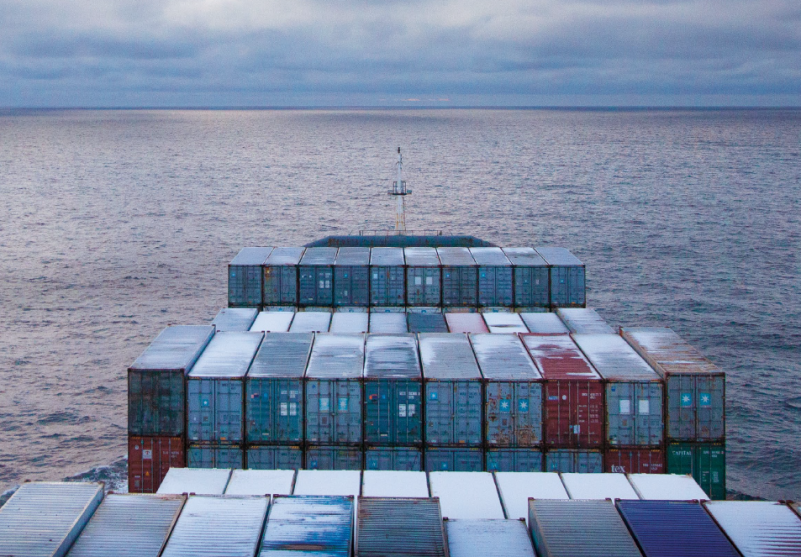Share post now
Article
New tricks with the tonnage tax
03.10.2022, Finance and tax policy
What the Federal Council and corporate lobbies are portraying as innocuous support for the shipping industry could prove the biggest tax loophole for Swiss commodities groups and circumvent the new OECD minimum tax.

The commodities sector benefits from the crisis – and soon from lower taxes in Switzerland?
© Stefanie Probst
In the view of advocates of Switzerland’s low-tax policy, commodity trading companies in Switzerland have come up somewhat short in recent years. Under the most recent corporate tax reform in 2019 (tax reform and AHV financing, TRAF), the Confederation scrapped the old tax privileges for holding and mixed companies (whereby Swiss corporate profits generated abroad were subject to zero taxes), from which the commodity groups had benefited substantially in the past. While the conservative majority in the federal parliament created new and special deductions for pharmaceutical and consumer goods companies custom-tailored to these industries to compensate for the old privileges, the commodities industry was left empty-handed. This is now to be corrected through the “tonnage tax”. Ostensibly, it is merely a tax break for Swiss shipowners, but as noted by the Federal Council in its dispatch on the tonnage tax, there are very close ties between them and commodities traders. Besides, it is already the case today that, if a commodities trader allows its intra-group shipping company to charge inflated freight rates – which cannot be detected in practice – profits of other companies in the same group can be reduced and taxes avoided in that way.
Rebirth of a concept already written off
During the most recent company tax reform, the Federal Council had removed the tax from the options, primarily out of concerns over constitutionality. With the tonnage tax, vessels are no longer to be taxed on the basis of the profits they earn for their operators, but based on net tonnage. The “net profit” thus obtained from navigation is then imputed to a firm’s profits from its other fields of activity. As this would mean that the taxation of certain companies would in principle diverge from the regular profit taxation method, the Federal Council at the time questioned its compatibility with the constitutional principle of taxation based on economic performance, and commissioned two legal opinions on the matter. In 2015, they both reached opposite conclusions. Robert Danon from Lausanne reached a negative conclusion, while Xavier Orberson from Geneva confirmed the constitutionality of the approach. Both law professors, by the way, hold lucrative mandates with business law firms that undertake tax optimisation for corporations. The key difference between the two opinions is that, unlike Danon, Orberson sees an existential threat to Switzerland’s maritime shipping industry and therefore considers the introduction of this flat rate taxation to be warranted under article 103 of the Swiss Federal Constitution as a structural policy measure. Considering the enormous importance of shipping to the world economy and how closely it is intermeshed with commodities traders – which are among Switzerland’s biggest and most profitable companies – that is a rather odd statement. At the time, the issue was too much of a hot potato for the Federal Council, whereas today, that body has obviously overcome its doubts even though the constitutional backdrop remains unchanged. In addition to misgivings about its constitutionality, the proposed law raises two other key problems:
- Taxation level: This would diminish significantly across all Swiss cantons compared with the regular profit tax rates. As the legal scholars Mark Pieth and Katrin Betz show in their new book on Switzerland’s shipping industry, the introduction of the tonnage tax means an average effective profit tax rate of roughly 7 per cent. That is substantially below the 11 per cent accorded to Glencore and other companies by Zug the commodity hub – and Switzerland’s fiscally most advantageous canton. In addition, the more environment-friendly the propulsion systems of vessels, the greater the tax relief the Federal Council is prepared to grant. If the maximum assessment of 20 per cent is accorded, average taxation can fall to as low as 5.6 percentage points. What is especially scandalous about this is that the Federal Council wishes to exclude profits subject to the tonnage tax from the new OECD minimum tax, which is designed to ensure that multinational corporations in Switzerland are taxed at a rate of at least 15 per cent. The introduction of a tonnage tax therefore circumvents international efforts to stop the “race to the bottom” in corporate taxes at what is already a very low level.
- Lacking environmental and labour standards on ships: The Federal Council and, up to now, also the Economic Affairs Committee of the National Council (the latter body is not expected to complete its discussion of the matter until 15 November) have been reluctant to tie the new tax privilege to what is known as a flag State requirement. That requirement would mean that shipping companies could benefit from the tonnage tax only in the case of ships sailing under the Swiss flag or the flag of a European Economic Area member State (EU countries plus Iceland, Norway and Lichtenstein). That would be an incentive to shipowners not to transfer their vessels to so-called flags-of-convenience countries, which constitute quasi-legal vacuums in the shipping industry, where they hardly need to comply with any government requirements in order to pursue their business. In the case of ships sailing under the Swiss flag, operators could be held to better environmental and labour standards. Pieth and Betz are of the view that “however problematic the tonnage tax may be,[…] it would still have indirect advantages: anyone having to register at least 60 per cent of their fleet under flags from the European Economic Area or the Swiss flag would potentially be subject to EU rules against unregulated scrapping in south Asia. However, the debate around corporate social responsibility in Switzerland also shows that the desire for higher standards in terms of the economy and human rights is rather modest within the ranks of the conservative majority in Federal Berne.
Constitutionally questionable, circumventing the OECD minimum tax and devoid of labour and environmental standards – introducing the version of the tonnage tax that is currently under discussion in the National Council’s Economic Affairs Committee would do credit to Switzerland’s dubious reputation as a tax haven for corporations. Besides, the companies that would stand to profit most are the very ones that garnered record profits on the back of the war and the energy crisis. Based in Baar in Zug, Glencore – the world’s second biggest oil trader (after Vitol, also headquartered in Switzerland) – generated a record profit of US$12 billion for the first half of 2022. Rather than provide additional scope for tax dumping by these war profiteers, the National Council and Council of States should bring in an excess profits tax to tap into these war profits and use the proceeds to help fight the multiple global crises.
